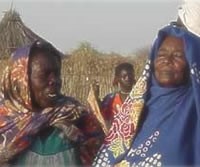Baggara, Hemat in Chad

Photo Source:
Sudan 101
|
Send Joshua Project a map of this people group.
|
| People Name: | Baggara, Hemat |
| Country: | Chad |
| 10/40 Window: | Yes |
| Population: | 456,000 |
| World Population: | 456,000 |
| Primary Language: | Arabic, Sudanese |
| Primary Religion: | Islam |
| Christian Adherents: | 0.02 % |
| Evangelicals: | 0.02 % |
| Scripture: | New Testament |
| Ministry Resources: | Yes |
| Jesus Film: | Yes |
| Audio Recordings: | Yes |
| People Cluster: | Arab, Shuwa |
| Affinity Bloc: | Arab World |
| Progress Level: |
|
Introduction / History
The Shuwa Arabs are commonly referred to as the "Baggara." This name is derived from the Arabic word bagar, meaning "cow," and refers to the Arab tribes in West Africa who are cattle herders. Unlike their Arab neighbors farther north, the Baggara are unable to herd camels because of the thicker vegetation. They live in a hot, semi-arid climate with zones ranging from sparse shrub lands to wooded grasslands.
The Baggara tribes are of Arab descent and mainly speak the Shuwa dialect of the Arabic language. There are now several subgroups of the Baggaras including the Hemat. They entered western Sudan between the twelfth and thirteenth centuries, and have gradually moved east and west from there. By the eighteenth century, they were concentrated primarily to the north and east of Lake Chad. Their tribes continued moving eastward until they became widely scattered across the horizontal plains of West Africa. They have intermarried with the tribes who lived close to them. This mixture of blood has given the Baggara darker skin and thicker lips than other Arabs.
Where Are they Located?
Baggara peoples like the Hemats are spread from the Lake Chad region eastward to the Nile River in the countries of Sudan, Niger, Chad, Cameroon, Nigeria, and the Central African Republic.
What Are Their Lives Like?
Most of the Baggara tribes are nomadic. Each year, the herds are moved south to the river lands during the dry season, and north to the grasslands during the rainy season. Before changing locations, the Hemat Baggaras usually plant sorghum, sesame, millet, and beans in their fields, harvesting the crops on their return.
The roles of Hemat Baggara men and women are very distinct. The women are responsible for milking the cows. They sell the raw milk to factories, and processed milk either at the marketplace or door to door. They keep the earnings for themselves, or use it to pay household expenses. The women also build the houses, tend to the children, go for water, prepare the daily meals, and trade in the marketplace.
The men are primarily involved with caring for the herds. They also plant and harvest the crops. Although the mother is the primary caretaker of the children, the father may also show them some affection, or discipline them from time to time. Since the women are capable of adequately maintaining the household, the men will sometimes leave for one or two years at a time to work in other countries.
The Baggara depend entirely on their animals for survival. The people feed on milk and cheese during the winter. They use animal fat and dung as healing ointments. Animal skins are used to make clothing and tents. Even the bones are used to make ornaments and weapons. The Hemet Baggara live in simple dome-shaped tents built by the women. They are portable structures that can easily be packed and moved along with the herds.
What Are Their Beliefs?
The Baggara have been Muslims since the thirteenth century. They wear the clothes prescribed by the Muslim religion, and bury their dead facing Mecca, the "holy city" of Islam.
The Hemat Baggara believe strongly in evil spirits. Each morning, a man sneezes in order to rid his nostrils of the evil spirit who slept there the night before. The Baggara also believe that men and women can be changed into animals such as were-crocodiles and were-hyenas.
What Are Their Needs?
Very little evangelization has been done among the Baggara tribes. The New Testament has been translated into their language, and some Christian broadcasts are also available to them. Some of the Baggara tribes have been ministered to by mission agencies. Because the people are so devoted to the Islamic faith, very few of them have converted to follow Jesus. Also, the nomadic lifestyle of the Baggara makes it very difficult for missionaries to reach them. Concentrated prayer and evangelism efforts are necessary in order to reach the hearts of Hemat Baggaras with the gospel.
Prayer Points
Ask the Lord to call out prayer teams to break up the soil through worship and intercession.
Pray that God will raise up long term workers to reach every Baggara tribe.
Pray that believers living in West Africa will be stirred with vision for outreach and a genuine burden to reach out to the Baggara tribes.
Ask the Lord to raise up strong local churches among the Hemat Baggara people where they can be discipled in the ways of Jesus Christ.